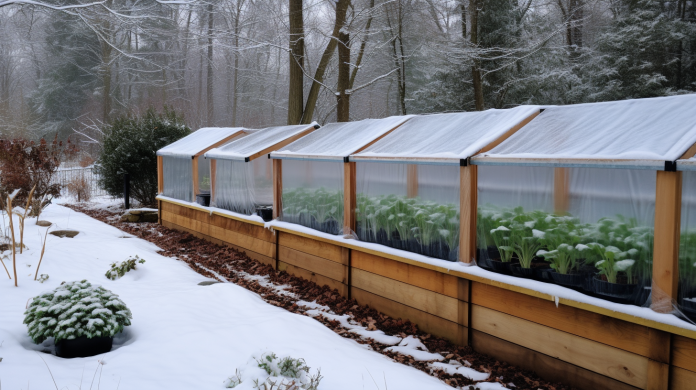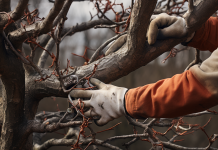Welcome to our article on winter pest control, where we provide expert tips to ensure less pests in the garden during the colder months.
As temperatures drop, pests seek shelter and food sources, posing a threat to your garden's health.
In this guide, we will delve into understanding winter pest behavior, explore natural control methods, discuss creating protective barriers, and offer insights into identifying and managing common winter garden pests.
By implementing these strategies, you can maintain a healthy and thriving garden all year round.
Understanding Winter Pest Behavior
During winter, many pests enter a state of hibernation to survive the harsh conditions. They seek shelter in warm and protected areas, such as under tree barks, in crevices, or inside buildings. This hibernation allows them to conserve energy and reduce their activity levels.
However, certain pests remain active during winter, especially if the weather is mild. These pests may continue to feed on plants and cause damage.
Natural Pest Control Methods for Winter
Implementing natural pest control methods is a sustainable approach to keeping your garden pests controlled during the winter months. Homemade pest repellents and companion planting strategies are effective ways to ward off pests without the use of harmful chemicals.
Homemade pest repellents, such as garlic and chili pepper sprays, can be easily made at home and applied to plants to deter pests. These natural repellents work by creating an unfavorable environment for pests, making them less likely to infest your garden.
Companion planting, on the other hand, involves planting certain crops next to each other to repel pests or attract beneficial insects that prey on pests. For example, planting marigolds or lavender near vegetables can help repel pests like aphids and whiteflies.
By utilizing these natural pest control methods early in the season, you can maintain a healthy garden throughout the winter season.
Creating a Protective Barrier for Your Garden
To safeguard your garden from pests during the winter months, consider implementing a protective barrier. Creating a physical barrier around your garden can help prevent pests from accessing your plants and causing damage. Here are some effective ways to create a protective barrier:
- Install a fence or wire mesh: Surrounding your garden with a fence or wire mesh can keep out larger pests like rabbits, deer, and squirrels.
- Use row covers: Row covers are lightweight, breathable fabrics that can be placed over plants to protect them from insects and other pests. They allow sunlight and water to reach the plants while keeping pests at bay.
- Apply natural repellents: Using natural repellents like garlic spray, neem oil, or vinegar can deter pests from your garden. These repellents are safe for plants and the environment.
Identifying and Managing Common Winter Garden Pests
Some common winter garden pests include aphids, slugs, snails, and spider mites.
Aphids can be identified by their small size and pear-shaped bodies, while slugs and snails leave behind slimy trails. Spider mites are tiny pests that can be detected by their webbing on plant leaves.
Once identified, it is important to implement organic pest control methods to manage them. These methods can include using natural predators like ladybugs and lacewings, using organic insecticides made from plant extracts, or employing physical barriers like row covers.
Maintaining Garden Hygiene to Prevent Pest Infestations
Effective garden hygiene is crucial for preventing pest infestations and maintaining a healthy garden environment. To ensure your garden remains healthy during the winter months, consider implementing the following practices:
- Proper composting techniques: Composting is an effective way to recycle organic waste and enrich the soil. However, it is important to follow the correct composting techniques, especially during winter, to minimize attracting pests. Avoid adding meat, dairy, or oily food scraps to your compost pile, as these can attract rodents and other pests.
- Utilizing beneficial insects: Encourage the presence of beneficial insects, such as ladybugs and lacewings, which are natural predators of garden pests. These insects can help control pest populations without the need for chemical pesticides. Planting flowers like marigolds and yarrow can attract these beneficial insects to your garden.
- Regular cleaning and maintenance: Keep your garden clean and free from debris, fallen leaves, and weeds as these can provide hiding places for pests. Regularly inspect your plants for any signs of pests or diseases, and promptly remove any affected plant parts to prevent further infestation.
Key Takeaways
- Implement sustainable approaches to pest control and use homemade pest repellents
- Create a protective barrier for the garden using fences, row covers, and natural repellents
- Maintain garden hygiene to prevent infestations.
Conclusion
In conclusion, understanding winter pest behavior, implementing natural pest control methods, creating a protective barrier, and practicing good garden hygiene are essential for maintaining a less pest garden during the winter season.
Please see our supporting article:
Planting Autumn Bulbs for Spring Beauty



